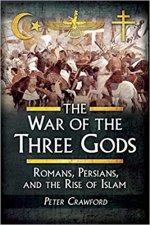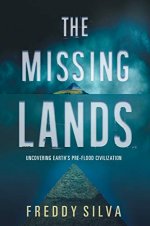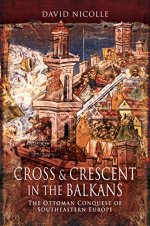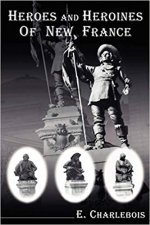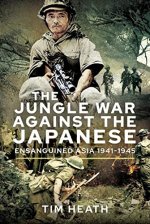You are using an out of date browser. It may not display this or other websites correctly.
You should upgrade or use an alternative browser.
You should upgrade or use an alternative browser.
What are the Forum members reading (5 Viewers)
- Thread starter Deitz
- Start date
Combat
Brigadier General
- Joined
- Jun 10, 2005
- Messages
- 11,173
I just watched that last weekend.
Mark
They made a kind of sequel/remake by the same name that wasn't bad. The original is a classic, though. Any movie with Ben Johnson and Dawn Wells (aka Mary Ann) has to be good. The book claims to have solved the case.
Reading several Lafayette Escadrille related books, memoirs and letter collections by McConnell, Chapman, Prince, and Rockwell. Also a new work called The Greek Victories and the Persian Ebb, 480-479 BC: The Battles of Salamis, Plataea, Mycale, and After written by Manousos Kambouris. It is Vol 3 of a 3 volume history. Haven't got the other 2 yet, but will be. Very interesting and well done. -- Al
Northgate Woods
Sergeant Major
- Joined
- Apr 5, 2007
- Messages
- 1,529
Guys, This is a great read if you a Falklands collector. Most books on the Falklands Ground War are about the Paras and Commandos. This just show how if Brigadier Lewis had of allocated his Troop of Blue and Royals at Goose Green how the casualty count would have much lower. This was proven out when 3 Troop gave fire support to 2 Para at the Battle of Wireless Ridge.
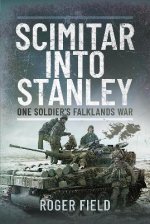
Cheers Howard

Cheers Howard
marco55
Brigadier General
- Joined
- Feb 18, 2008
- Messages
- 11,664
I bought the book for my cousin this Christmas. The author names :rolleyes2: the killer at they end.They made a kind of sequel/remake by the same name that wasn't bad. The original is a classic, though. Any movie with Ben Johnson and Dawn Wells (aka Mary Ann) has to be good. The book claims to have solved the case.
Mark
Combat
Brigadier General
- Joined
- Jun 10, 2005
- Messages
- 11,173
Some fantastic versions of The Godfather from Suntup. There are still some artist editions available:
The Godfather by Mario Puzo - Suntup Editions
The Godfather by Mario Puzo - Suntup Editions
They are gorgeous. I grabbed an AE (Artist's Edition), which was the least expensive version. Also, check out the Suntup versions of Schindler's Ark. They are quite impressive, as well. -- AlSome fantastic versions of The Godfather from Suntup. There are still some artist editions available:
The Godfather by Mario Puzo - Suntup Editions
Combat
Brigadier General
- Joined
- Jun 10, 2005
- Messages
- 11,173
This sounds interesting - "Jamie MacGillivray" by John Sayles. A good, long historical fiction to book to finish off the winter:
[FONT="]Spanning 13 years, two continents, several wars, and many smoke-filled and bloody battlefields, John Sayles’s thrilling historical and cinematic epic invites comparison with Diana Gabaldon, George R. R. Martin, Phillippa Gregory, and Charles Dickens.[/FONT][FONT="]
It begins in the highlands of Scotland in 1746, at the Battle of Culloden, the last desperate stand of the Stuart ‘pretender’ to the throne of the Three Kingdoms, Bonnie Prince Charlie, and his rabidly loyal supporters. Vanquished with his comrades by the forces of the Hanoverian (and Protestant) British crown, the novel’s eponymous hero, Jamie MacGillivray, narrowly escapes a roadside execution only to be recaptured by the victors and shipped to Marshalsea Prison (central to Charles Dickens’s [/FONT][FONT="]Hard Times[/FONT][FONT="]) where he cheats the hangman a second time before being sentenced to transportation and indentured servitude in colonial America "for the term of his natural life." His travels are paralleled by those of Jenny Ferguson, a poor, village girl swept up on false charges by the English and also sent in chains to the New World.
The novel follows Jamie and Jenny through servitude, revolt, escape, and romantic entanglements -- pawns in a deadly game. The two continue to cross paths with each other and with some of the leading figures of the era- the devious Lord Lovat, future novelist Henry Fielding, the artist William Hogarth, a young and ambitious George Washington, the doomed General James Wolfe, and the Lenape chief feared throughout the Ohio Valley as Shingas the Terrible.[/FONT]
[FONT="]Spanning 13 years, two continents, several wars, and many smoke-filled and bloody battlefields, John Sayles’s thrilling historical and cinematic epic invites comparison with Diana Gabaldon, George R. R. Martin, Phillippa Gregory, and Charles Dickens.[/FONT][FONT="]
It begins in the highlands of Scotland in 1746, at the Battle of Culloden, the last desperate stand of the Stuart ‘pretender’ to the throne of the Three Kingdoms, Bonnie Prince Charlie, and his rabidly loyal supporters. Vanquished with his comrades by the forces of the Hanoverian (and Protestant) British crown, the novel’s eponymous hero, Jamie MacGillivray, narrowly escapes a roadside execution only to be recaptured by the victors and shipped to Marshalsea Prison (central to Charles Dickens’s [/FONT][FONT="]Hard Times[/FONT][FONT="]) where he cheats the hangman a second time before being sentenced to transportation and indentured servitude in colonial America "for the term of his natural life." His travels are paralleled by those of Jenny Ferguson, a poor, village girl swept up on false charges by the English and also sent in chains to the New World.
The novel follows Jamie and Jenny through servitude, revolt, escape, and romantic entanglements -- pawns in a deadly game. The two continue to cross paths with each other and with some of the leading figures of the era- the devious Lord Lovat, future novelist Henry Fielding, the artist William Hogarth, a young and ambitious George Washington, the doomed General James Wolfe, and the Lenape chief feared throughout the Ohio Valley as Shingas the Terrible.[/FONT]
theBaron
Major
- Joined
- Mar 27, 2008
- Messages
- 10,536
"America's Revolutionary Mind: A Moral History of the American Revolution and the Declaration That Defined It", by C. Bradley Thompson.
He also maintains a blog, The Redneck Intellectual, at https://cbradleythompson.substack.com/
Prost!
Brad
He also maintains a blog, The Redneck Intellectual, at https://cbradleythompson.substack.com/
Prost!
Brad
Terp152
Major
- Joined
- Sep 17, 2009
- Messages
- 6,680
Always found it interesting to see what the forum members are reading, so a bit disappointing nothing posted for several months. Here's my update. Bought a copy of Behind Japanese Lines, Detachment 101. History of the Kachin Rangers organized by the OSS in Burma where they fought for almost 4 yrs. They fought in conjunction with Merrill's Marauders (a movie was made about them). Never got around to reading the book but just finished the audio version. Amazing what they and the Americans endured to beat the Jap(anese). Chris
Combat
Brigadier General
- Joined
- Jun 10, 2005
- Messages
- 11,173
I'm a big fan of the Osprey campaign books but some of their longer, hardback titles are poorly written or so dense that they are unreadable. "The Panzers of Prokhorovka" sounded like a great book but it is mired in detail about how the Germans recorded damaged vehicles etc.
Currahee Chris
Sergeant Major
- Joined
- Apr 24, 2007
- Messages
- 4,776
I'm a couple hundred pages deep into Jeremy Wilson's Lawrence of Arabia bio. The first hundred plus pages were excellent- covers his childhood and his dig at Carchemesh. Now the book is mired down into the political situation of the ME during the onset of WW1. I hate that about books on LoA- they seem to get so off topic with trying to outline the political situation that the reader may go dozens of pages before Lawrence's name appears. Sykes-Picot was huge of course and Allenby and the rest of the characters are all important but they just seem to make reading anything about LoA tiresome.
This tome is 924 pages long with another near 200 pages of footnotes and appendices.
This tome is 924 pages long with another near 200 pages of footnotes and appendices.
Currahee Chris
Sergeant Major
- Joined
- Apr 24, 2007
- Messages
- 4,776
"America's Revolutionary Mind: A Moral History of the American Revolution and the Declaration That Defined It", by C. Bradley Thompson.
He also maintains a blog, The Redneck Intellectual, at https://cbradleythompson.substack.com/
Prost!
Brad
I plowed through two books on Brandywine and the thing I have found is that AWI authors, especially academics, have a tendency to just reprint letters and diary entries from the protagonists and it gets confusing reading page after page of that type of authorship. I need to get back to McCullough and perhaps Atkinson. I always liked McCullough's work. I fear that this type of writing is souring my interest in the AWI.
I do enjoy stories about the Pa campaigns for obvious reasons
Users who are viewing this thread
Total: 6 (members: 0, guests: 6)


